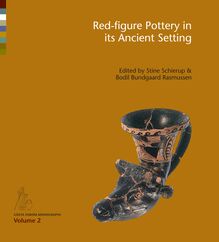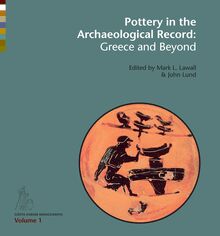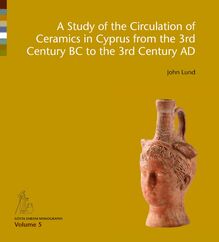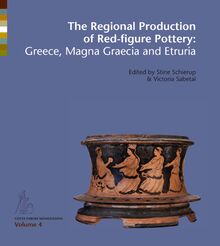Red-figure Pottery in its Ancient Setting , livre ebook
181
pages
English
Ebooks
2012
Obtenez un accès à la bibliothèque pour le consulter en ligne En savoir plus
Découvre YouScribe et accède à tout notre catalogue !
Découvre YouScribe et accède à tout notre catalogue !
181
pages
English
Ebooks
2012
Obtenez un accès à la bibliothèque pour le consulter en ligne En savoir plus
Publié par
Date de parution
22 mai 2012
Nombre de lectures
0
EAN13
9788771243321
Langue
English
Poids de l'ouvrage
47 Mo
To highlight these interpretative challenges the National Museum of Denmark in 2009 stages the colloquium "Red-figure Pottery in its Ancient Setting" and invited a group of specialists to present cases from within their areas of research which would serve to enhance our understanding of the great range of the character and value of red-figure pottery and its imagery whether in local Greek, a colonial Greek, en Etruscan or any other indigenous community.
The various cases presented in these proceedings of the colloquium clearly demonstrate that this approach to the study of Greek pottery and its imagery has much to offer.
Publié par
Date de parution
22 mai 2012
EAN13
9788771243321
Langue
English
Poids de l'ouvrage
47 Mo
GÖSTA ENBOM MONOGRAPHS
Volume 2
Red-figure Pottery in
its Ancient Setting
Edited by Stine Schierup &
Bodil Bundgaard Rasmussen
Red-figure Pottery in
its Ancient Setting
Acts of the International Colloquium held at
the National Museum of Denmark in Copenhagen,
November 5-6, 2009
Edited by Stine Schierup &
Bodil Bundgaard Rasmussen
This page is protected bycopyright and maynot be redistributed
Aarhus University Press
RED-FIGURE POTTERY IN
ITS ANCIENT SETTING
© Aarhus University Press and
the authors 2012.
Gösta Enbom
Monographs
General editor:
Bodil Bundgaard Rasmussen.
Editorial board:
Mark L. Lawall, John Lund,
Dyfri Williams.
Gösta Enbom Monographs is
a peer reviewed series.
Published with support
from The Foundation of
Consul General Gösta Enbom.
Graphic design:
Nina Grut, MDD.
E-book production: Narayana Press
Typeset with Stone Serif
and Stone Sans.
ISBN 978 87 7124 332 1
ISSN 1904-6219
Aarhus University Press
Langelandsgade 177
DK-8200 Aarhus N
White Cross Mills
Lancaster LA1 4XS
England
Box 511
Oakville, CT 06779
USA
www.unipress.dk
Front cover:
Apulian rhyton, tomb 19, La
Scala cemetery, Roccagloriosa
(Photo: E. Salinardi).
Back cover:
1) Athens, National Archaeological
Museum, inv. 12486
(Photo courtesy: National
Archaeological Museum at
Athens, Ministry of Culture/TAP).
2) Paris, Musée du Louvre, inv.
CA 308 (Photo courtesy: RMN,
Musée du Louvre).
Amphora attributed to the painter
Syriskos, Athens 500-470 BC,
Collection of Classical and Near
Eastern Antiquities, The National
Museum of Denmark, inv.no. Chr.
VIII 320.
This page is protected bycopyright and maynot be redistributed
Table of Contents
5Per Kristian Madsen
Preface
7Stine Schierup & Bodil Bundgaard Rasmussen
Introduction
11Martin Langner
Mantle-figures and the Athenization of Late
Classical Imagery
21Annie Verbanck-Piérard
Herakles and his Attic Pillars: Iconographical Study
and Socio-religious Context of the Four Column
Herakleion
33Adrienne Lezzi-Hafter
The Xenophantos Chous from Kerch with Cypriot
Themes
43Athena Tsingarida
White-ground Cups in Fifth-century Graves:
A Distinctive Class of Burial Offerings in Classical
Athens?
59Maurizio Gualtieri
Late ‘Apulian’ Red-figure Vases in Context:
A Case Study
69Helena Fracchia
Changing Contexts and Intent: the Mourning
Niobe Motif from Lucania to Daunia
81 Victoria Sabetai
Boeotian Red-figure Vases: Observations on their
Contexts and Settings
99 Martin Bentz
Elean Red-figure Pottery from Olympia
109 Thomas Mannack
An Overview of Athenian Figure-decorated Pottery
in Southern Italy and Sicily
117 Stine Schierup
A Heroic Emblem: The Cultural Transformation of
the Panathenaic Amphora in Southern Italy.
133 Guy Hedreen
Vase-painting and the Narrative Logic: Achilles and
Troilos in Athens and Etruria
147 Abstracts
151 Bibliographic Abbreviations
155 Bibliography
177 List of Authors
This page is protected bycopyright and maynot be redistributed
This page is protected bycopyright and maynot be redistributed
Preface
B Y P E R K R I S T I A N M A D S E N
D I R E C T O R G E N E R A L
T H E NA T I O N A L M U S E U M O F D E N M A R K
th
In the early 19 century the Danish Prince Christian
Frederik and his wife, Caroline Amalie, undertook a Grand
Tour of Europe. In 1820 they settled for a several months
in Naples enjoying the rich cultural and social life of the
town. The royal couple was soon introduced to Giuseppe
Capece Latro, former Archbishop of Taranto and the
owner of a fairly large collection of antiquities. The Prince
developed a serious interest in the collection and on the
advice of P.O. Brøndsted, classicist and ‘agent of the Royal
Danish Court to the Holy See’, he acquired the greater part
of it. The acquisition comprised above all vases – a total of
around 200 – decorated vases representing the various local
styles of Southern Italy, a large group of Gnathia pottery
and another large group of black glazed vases and a few
Greek vases. The Prince established a Vase Cabinet at the
Royal Palace in Copenhagen and spent a lot of time with
his collection playing an active role in further acquisitions
until his accession to the throne in 1839 as King Christian
VIII made this more difficult. Upon the King’s death in
1848 the collection was incorporated into the National
Museum, where studies into ancient pottery ever since have
been a major research field.
In 2008 the research programme “Pots, Potters and
Society in Ancient Greece” was launched thanks to a
generous grant from The Foundation of Consul General
Gösta Enbom. The programme focuses on two main
themes: 1) a societal and economic aspect, the production
of – and trade in – pottery as a source for understanding
the ancient economy, and 2) an ideological/iconographical
aspect: vase paintings and other iconographical evidence
as a source for understanding the life and thoughts
of the ancients. “Pots, Potters and Society in Ancient
Greece” seeks to further our knowledge of both themes
and if possible to develop new theoretical approaches
by combining existing knowledge with fresh ideas. To
pursue this goal international thematic colloquia are held
at regular intervals and in 2008 a PhD scholarship was
launched in collaboration with Aarhus University entitled
Consul General Gösta Enbom
(1895-1986).
“Greek Iconography in Southern ItalI .yropm d edtniat tcA
early South Italian red-figure pottery from Lucanian and
Apulian sites”.
Taking its cue from the theme of the PhD-study the
National Museum in November 2009 staged the colloquium
“Red-figure Pottery in its Ancient Setting” aimed at
highlighting the significance of the various settings and
cultural contexts of red-figure pottery be it in Greece or
outside Greece.
I wish to thank all contributors to both colloquium and
the present publication for accepting our invitation and
shedding light on the cultural encounters traceable in the
iconography of ancient pottery. My thanks also go to the
Foundation of Consul General Gösta Enbom for generous
support of both colloquium and publication.
This page is protected bycopyright and maynot be redistributed
P R E F A C E
5
This page is protected bycopyright and maynot be redistributed
Introduction
B Y S T I N E S C H I E R U P &
B O DIL B U ND GA ARD R AS MU SSE N
The study of red-figure pottery is one of the cornerstones
of classical archaeology. Thousands and thousands of
vessels and potsherds have been excavated throughout
the Mediterranean countries, an endless number of
publications on the topic have been produced, and scholars
have dedicated their lives to the study of figured Greek
vases. Yet, we still must face the challenge of trying to
understand the meaning of figured Greek pottery through
the prism of the present.
Imagery was undoubtedly an important part of
ancient Greek society, but ancient written sources remain
remarkably silent about pottery, perhaps because figured
vases were of a completely different character than other
major sources of Attic imagery, including sculpture, wall
painting and fine metal ware. First of all the vases were
produced in very high quantities and by a great number
of different potters, and secondly they were part of
everyday life and thus potentially a strong medium for
communicating social or political views and messages to
a wide audience. Thirdly, they were easily transported far
beyond the borders of their place of origin, thus promoting
the spread of the iconographical language of Athens and
its adaptation in other cultural settings throughout the
Mediterranean world. Indeed, in this way they become a
means for understanding not only the culture of Athens
in the Classical period but also of cultures far beyond the
Athenian city-state.
The question presents itself as to how the setting
of the pottery, in other words the various contexts in
which it appears, can provide criteria for reaching a
fuller understanding of its function and iconography, in
particular how Attic iconographic themes were altered or
absorbed as they entered into new cultural settings.
In the wake of the passionate debate about the
study of Greek pottery that dominated the 1990s, in
which iconographic, stylistic and socio-anthropological
approaches were juxtaposed, especially in the form of
connoisseurship versus structuralism, such questions have
come increasingly into sharp focus. The more so with
the contextual and anthropological approach to figured




